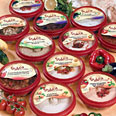
Israeli hummus taking US by storm
Wall Street Journal reports rise in chickpea spread sales in America, led by Sabra Dipping Co. – joint venture of PepsiCo and Israel's Strauss Group
A report titled "Hummus is conquering America," defines the popular Middle Eastern food as a chickpea dip which is low in fat and high in protein, and is earning a growing following among Americans seeking more-healthful snacks.
According to the WSJ, market-research firm Information Resources Inc. reported that sales of "refrigerated flavored spreads" – a segment dominated by hummus – totaled $530 million at US food retailers in 2012, up 11% from a year earlier and a 25% jump over 2010.
Sabra's hummus sales were estimated at about $315 million last year, and the company wants to cultivate a commercial crop in Virginia to reduce its dependence on the legume's main US growing region – the Pacific Northwest – and to identify new chickpea varieties for its dips and spreads.

Sabra's R&D facility in Richmond, Virginia (Photo: Ilya Welfeld)
For Sabra, which makes hummus at a plant near Richmond, Va., a secondary source of supplies could help protect the company if a chickpea shortage occurred because of crop failures in Washington or Idaho, the WSJ says. Sourcing chickpeas locally also would lower its shipping costs.
Center of Excellence
Meanwhile, on Tuesday Sabra inaugurated its new Center of Excellence (COE) research and development facility in at its hummus manufacturing facility in Richmond, Virginia. The company said the center would further research capabilities and improve Sabra's products in all aspects of food manufacturing and distribution, from agriculture, nutrition and food science to engineering, packaging and product delivery.
The COE supports Sabra and the international venture between PepsiCo and Strauss Group, called Obela. According to the company, the center is the first-of-its-kind research and development center for refrigerated dips and spreads.
"We are honored to partner with Obela to push the envelope in research and development, opening a world of possibilities in dips and spreads in terms of innovation, taste, health and more," said Ronen Zohar, CEO of Sabra Dipping Company. "The potential is as promising as it is delicious."
In 2008 PepsiCo bought a 50% stake in Strauss' Sabra, which had been active in the US for several years. The Sabra hummus is manufactured in 12 flavors and leads hummus sales in the US.
According to the WSJ, Sabra is responsible for its hummus' growing popularity among Americans thanks to its marketing method: In addition to the first national television advertising campaign the company began earlier this year, it has helped introduce more Americans to hummus through huge sampling events in major cities in which it has handed out 10,000 2-ounce (28-gram) packages a day.










